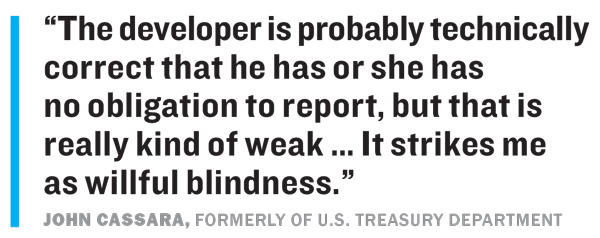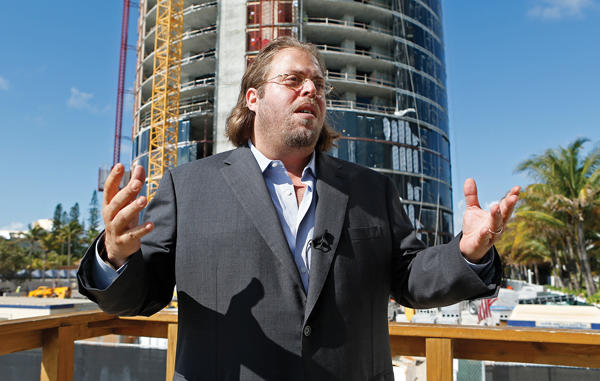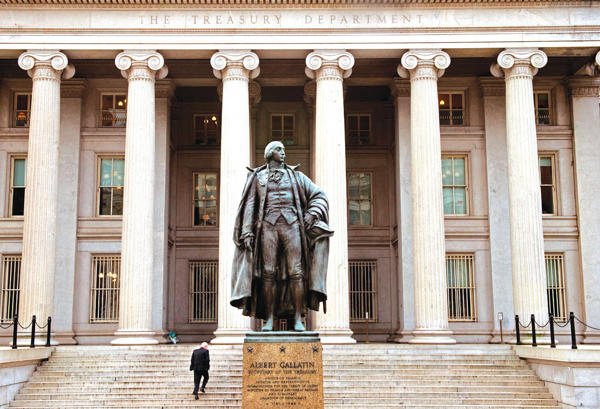A lawyer with ties to Venezuela’s oil ministry, a member of the country’s “boliburguesía” elite and a money launderer sat around a Caracas office table while armed guards and a German shepherd with a shock collar stood watch.
The boliburgués placed his handgun on the table. It was November 2015, and the three Venezuelans were pressuring an unnamed associate to persist with a scheme that U.S. authorities would later allege embezzled $1.2 billion from the Venezuelan state oil company, PDVSA. Much of that money, according to a criminal complaint, ended up in South Florida real estate.
Among those reportedly alleged to be connected to the scheme: the three stepsons of the country’s embattled president, Nicolás Maduro; a billionaire Venezuelan TV mogul; and former executives at PDVSA. Eight people have been charged in the case so far, while one defendant — a wealth manager at a Swiss bank — was arrested in August.
With a federal investigation ongoing, the U.S. attorney’s office could seize at least 16 South Florida properties tied to the defendants. But in the initial complaint filed in July 2018, only one was explicitly named: Unit 2205 at the Porsche Design Tower in Sunny Isles. Federal officials allege this condo was ultimately transferred by Carmelo Urdaneta Aqui – who until 2015 was legal counsel to the Venezuelan oil ministry – to the alleged money launderer, José Vicente Amparan Croquer, as payment for services rendered.
Luxury real estate in South Florida has long served as a magnet for wealth from South America. The continent’s tycoons, celebrities, athletes and assorted hustlers have seen it both as a playground and a bank — a good place to invest or park cash, given its proximity, culture, weather and, most of all, its discretion: The provenance of the wealth has historically mattered little to Miami-area developers and brokers. What’s mattered is that their buyers have it.
But even though today’s tougher anti-money laundering laws impose stricter disclosure requirements on banks and lenders involved in real estate purchases, those who build product and those who sell for them can continue to benefit from a culture of secrecy, thanks in no small part to the real estate industry’s intense lobbying and donations at every rung of the political ladder.
“Developers and real estate agents have no legal obligation to conduct customer due diligence on the purchasers of real property,” said Ross Delston, a Washington, D.C.-based lawyer and anti-money laundering expert, “other than to abide by the general tenet that a business would want to avoid taking part in a criminal scheme.”

Gil Dezer, who built the Porsche Design Tower, maintains that his firm operates within the law. He cited anti-discrimination laws, including the Fair Housing Act, that his company interpreted as requiring it to sell to a buyer who can sign a contract and send a deposit. It’s an argument some of his fellow developers have also made. But experts in money laundering and housing law challenged this interpretation.
“There’s nothing in the fair housing law that eliminates or reduces the duty to ensure the legitimacy of funds in a transaction,” said Charles Intriago, a former federal prosecutor and anti-money laundering expert. “That’s bullshit.”
The builder
In May 2016, Urdaneta told associates about a “significant deposit” he put down on a unit in Miami. The developer, he said according to the complaint, was pressuring him to close in 60 days.
The condo was located on the 22nd floor of the glassy, black cylindrical Porsche Design Tower. The skyscraper marked the apex of the post-recession luxury condo construction boom in South Florida, and the buyer pool, the building’s marketing materials bragged, included 22 billionaires. Among the owners: Carlos Peralta Quintero, chairman of Grupo IUSA; Igor Yakovlev, a Russian home appliance mogul; and Terry Taylor, America’s biggest car dealer. Prices started at $1,100 a foot, unheard of at the time in Sunny Isles, and Taylor paid $2,600 a foot, or $25 million, for the four-story penthouse.
The tower was geared toward “the wealthy, runners and gunners, the machismos and testosterones,” said Peter Zalewski, a principal with the Miami real estate consultancy Condo Vultures. “That was the niche, that’s who they were hitting.”
That description could easily be used for the developer himself, Dezer: A brash 40-something with a penchant for supercars and shirts with one too many buttons open.
Dezer is the only son of Israeli émigré Michael Dezer, who in the 1970s used proceeds from a junk mail business to amass a Manhattan real estate portfolio. He then expanded out to South Florida, and today the family owns over 27 acres of oceanfront property in Sunny Isles. Dezer joined the family business in the late 1990s while taking night classes at the University of Miami. He found success in establishing licensing agreements with someone he had long admired, Donald Trump, and Dezer Development went on to build six Trump-branded towers. In December 2007, Dezer got married at Trump’s Mar-a-Lago, with Melania Trump and Ivanka Trump in attendance.
Like Trump, Dezer’s tastes tend to the extravagant. His personal car collection includes a $1.5 million Bugatti Veyron, and he has a 1950 Porsche Spyder 550 mounted on the wall of his home. He also owns a $17 million silver Gulfstream IV jet, which he showed off on a CNBC segment of “Secret Lives of the Super Rich.” (Still, he was careful to note in a 2016 Bloomberg profile that “we don’t have security guards and things like that. We don’t show it off too much.”)
In 2012, Dezer secured a master licensing agreement with German-based Porsche Design Group. The building would feature a patented car elevator, known as the “Dezervator,” which would allow owners to park their vehicles right next to their residences in so-called “sky garages.”

Gil Dezer discussing the Porsche Design Tower in Sunny Isles Beach in 2015.
In a 2013 interview with The Real Deal, he explained his vision for the tower. “In the downturn,” he said, “we decided we had to do something so unique, so crazy, so outrageous, so incredible, that we’re not going to be looking for a buyer who needs financing, because at that time there was zero financing. We needed people who had a lot of money and who would respect something that was so wow that they’d want to buy it.”
Unlike some other big developers, Dezer Development did not tap outside brokerages such as Douglas Elliman or One Sotheby’s International Realty to sell condos. Instead, it relied on its internal sales operation, Dezer Platinum Realty.
“We market, we don’t advertise, and the upper-level marketing I do myself,” Dezer said in that 2013 interview. “With most of these guys, the key is to make them want it and to be willing to part with their money to have it.”
The buyer(s)
Urdaneta, for one, was willing. According to a confidential informant cited by U.S. authorities in the complaint, he and his co-defendants had gamed Venezuela’s unusual currency exchange system to reap large rewards.
Venezuela had a system where the government was able to exchange its currency (bolivars) at a fixed rate for U.S. dollars. But the fixed exchange rate, six bolivars to one dollar, was far more favorable than the actual exchange rate, 60 bolivars to one dollar. This opened up a possibility for fraud and abuse.
If someone, for example, was able to exchange $10 million for 600 million bolivars at the actual rate, and then exchange the money at the government’s fixed rate, they would end up with $100 million. In just two transactions, someone could make a $90 million profit by exploiting this difference.
According to the complaint, Urdaneta and his co-defendants pulled off a similar maneuver by bribing officials at PDVSA. One of the alleged money launderers they used, Amparan, also known as Chente, needed to be paid. The unit at the Porsche Design Tower would become his fee.
As the tower neared completion, Urdaneta received an email from Dezer Development that perturbed him. The email included a pre-closing questionnaire, with a caveat that “taking title under a company or trust may trigger FinCEN reporting requirements.”
The Financial Crime Enforcement Network (FinCEN), a bureau of the U.S. Treasury, is tasked with looking into crimes including money laundering. In January 2016, just a few months before Unit 2205 was purchased, FinCEN launched its Geographic Targeting Order (GTO) program, which requires title insurance firms to identify the beneficial owners of shell companies seeking to purchase luxury residential real estate in all-cash deals.
 “Under the GTOs, the responsibility has been handed to the title insurance companies,” said Andrew Ittleman, an attorney who focuses on white-collar defense and money-laundering cases. “They have been deputized to address this issue.”
“Under the GTOs, the responsibility has been handed to the title insurance companies,” said Andrew Ittleman, an attorney who focuses on white-collar defense and money-laundering cases. “They have been deputized to address this issue.”
Given Urdaneta’s deep ties to PDVSA, which were the subject of a 2015 U.S. investigation into a $2 billion money laundering scheme, it would make sense that he would not want to buy the unit in his name. So, according to the complaint, he created a company with his wife as a beneficiary and used that to make the $5.3 million purchase. Property records show that his wife was listed as the manager of a Florida company called Paladium Real Estate Group, created in June 2016.
“Dezer Development allows buyers to close on units in the name of a company so long as the individual controlling the company is the same as the person who signed the initial contract,” the developer said in an email to TRD. “We do this to make sure buyers are not flipping.”
In 2013, Dezer had spoken of personally taking charge of the “upper-level marketing” of the building. When asked now about Unit 2205, however, Dezer said: “I was not involved in this sale. I never met the buyer.”
The complaint alleges that Urdaneta then sought to transfer the unit to Amparan. On Sept. 23, 2016, Amparan’s wife was added as a manager of Paladium, and on Sept. 15, 2017, after the closing, Urdaneta’s wife was removed, leaving Amparan effectively in control of Paladium and thus the condo, according to the complaint.
The purchasing entity was set up through a Brickell Avenue law firm, Juris Magister. Calls and emails to the firm were not returned.
“After closing the developer is no longer involved in transfers of that unit,” Dezer said. As of August 2018, 118 of the building’s 132 units have closed, he added. The total projected sellout of the tower, according to a press release from the developer in March 2017, was $840 million.
The Money Laundering Control Act of 1986, which made the practice a federal crime, came during the heyday of Miami’s “cocaine cowboys.” Banks facilitated the money laundering that was essential to the city’s rampant narcotics trade, and the proceeds were pushed through real estate.
Unlike most other cases where money laundering in real estate is alleged, the buyers of Unit 2205 are listed clearly in Miami-Dade County property records instead of being concealed through a labyrinth of opaque offshore or Delaware shell companies such as those documented in the Panama Papers. Property records show Amparan’s wife, Carolina Croquer, as the most recent owner of the property.
Financial institutions are required to flag a transaction to FinCEN following a suspected incident of money laundering or fraud. Real estate brokers, escrow agents and other real estate professionals, however, are not subject to these same rules.
Money laundering experts said that unless Dezer Development was explicitly aware that Urdaneta had purchased the unit for money laundering purposes, the company would not be required to report it.
“The developer is probably technically correct that he has or she has no obligation to report, but that is really kind of weak, particularly in today’s environment,” said John Cassara, a former special agent with the U.S. Treasury who focused on money laundering.
“It strikes me as willful blindness,” Cassara added. “They don’t want to ask questions.”
A FinCEN advisory last July said the bureau encourages brokers, escrow agents and other real estate professionals to “voluntarily report suspicious transactions involving real estate purchases and sales.”
The influence game
One of the reasons real estate brokers are exempt from the same requirements as financial institutions, experts said, is the industry’s successful lobbying efforts.
In total, the National Association of Realtors has spent $27.52 million in lobbying so far in 2018, data from the Center for Responsive Politics shows, ranking second out of 3,669 organizations involved in lobbying. Since 1998, the group has spent nearly $500 million on lobbying, the data shows.

A FinCEN advisory last July said the bureau encourages real estate professionals to “voluntarily report suspicious transactions involving real estate purchases and sales.”
In total, 44 federal lobbying disclosures were filed on anti-money laundering reporting issues in the first quarter of 2018, up from 21 during the same time last year, according to Bloomberg.
“After the passage of USA PATRIOT Act in 2001 it was expected that FinCEN would include real estate agents as one of the businesses subject to the new rules,” said Delston, the D.C-based anti-money laundering expert. “Not only did that not happen, but also real estate agents were expressly exempted from coverage by those rules.”
On top of NAR’s lobbying, real estate developers have gained clout by donating extensively to both local and national politicians, political parties and political action groups. Michael Dezer gave $100,000 to the pro-Trump Make America Great Again political action committee in 2015, along with Seryl Kushner of Kushner Companies. And according to a sworn statement filed in April, North Miami Beach’s then-mayor, George Vallejo, admitted that his wife was on the Dezers’ payroll at the same time that he was voting on issues related to Dezer Development’s proposed projects. Vallejo said he used an LLC to hide payments from the public so that “his wife’s business would not be seen by … all the political enemies,” according to the statement.
Related Group’s Jorge Pérez gave money directly to local candidates, including congressional candidates Matt Haggman and Donna Shalala, as well as $245,000 to Right to Rise USA, a political action committee for Jeb Bush. There’s also Moishe Mana, who has donated to a number of Democratic candidates, including $33,400 in 2016 to the DNC Services Corporation, a PAC that gives money to Democratic candidates.
Elizabeth Mendenhall, current president of NAR, said in a statement that “real estate professionals understand their responsibilities in the current efforts to combat money laundering, such as filing suspicious activities reports.”
However, Mendenhall added, federal mandates for brokers “already subject to diverse and comprehensive state and local licensing laws across the country would prove burdensome and unnecessary.”
The NAR’s website further states that “any risk-based assessment would likely find very little risk of money laundering involving real estate agents or brokers.”
Local South Florida brokers echoed the point that the responsibility to report transactions under the GTOs should fall on the title insurance industry rather than them.
“The burden is currently in the right place, which is with a company and an industry that understands the reporting guidelines,” said Christina Pappas, district sales manager with the Keyes Company in Coral Gables.
“At the end of the day, our responsibility is to be a consultant to the customer … to help a buyer buy and a seller sell,” she added. “If someone wants to hide something, they are going to be able to hide something.”
Michael Haltman, the president of Hallmark Abstract Service, a New York-based title insurance provider, said his industry is well-suited to report suspicious transactions because title insurance firms are a “third party to the transaction” and “have less of a vested interest in the business.”
However, that distance from the deal also makes it less likely that they have the full picture. “These people [brokers] are salespeople, they are selling a property,” Haltman said. “That’s their job, and that’s what they do, and unless the government says you need to know your client then nothing will change.”
“I would imagine,” he said, “that realtors talking to a buyer would be in the best position to know what the true intention of the buyer really is.”
An endemic issue
The criminal indictment in the case, filed Aug. 16, lists another 16 South Florida properties as being tied to the defendants. These include a condo at the Related Group’s Icon Brickell, six units in a small Miami Beach apartment complex, four Coral Gables homes and a Wellington equestrian estate with adjacent vacant land. Related declined to comment.
The government defines some of the properties in the indictment as “substitute properties” that it can seize if necessary, but does not allege the properties are connected to any criminal activity. The Porsche Design Tower unit, however, is set to be seized by the government.
Even so, Dezer Development maintained that it was following the letter of the law outlined in the Fair Housing Act and other legislation mandating that a developer sell to a buyer with the ability to sign a contract and send a deposit.
Money laundering experts and fair housing experts however, called this interpretation expedient.
Rigel Oliveri, a University of Missouri professor who studies the Fair Housing Act, said “it prohibits discrimination, [but] it doesn’t say that you have to sell to every person, it doesn’t say you can’t do a background check.”
In response, Dezer said: “What are my other options if I advertise a unit for sale and someone agrees to buy it, writes a contract for the price I am asking and gives me a deposit? What would be a valid reason to turn them down? Because they are from a different country? Because they have different political beliefs? What is an acceptable test?”
